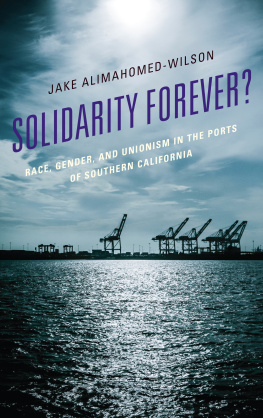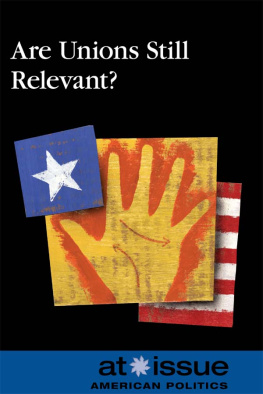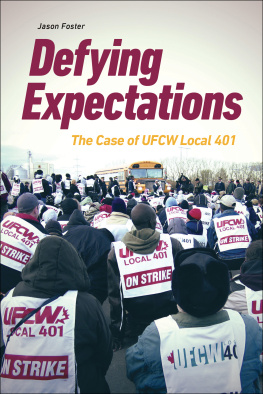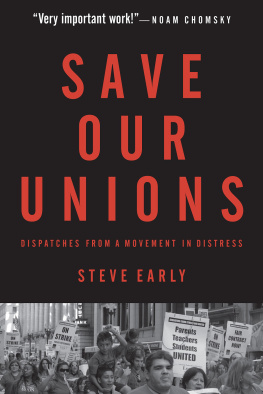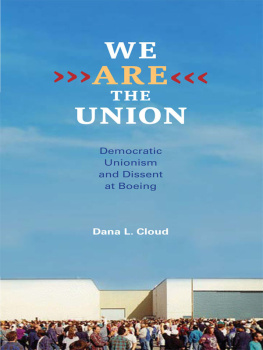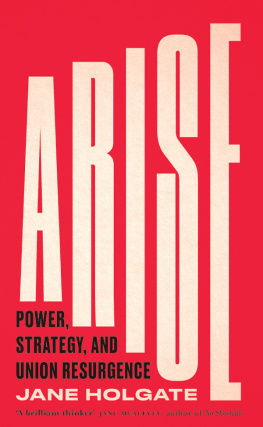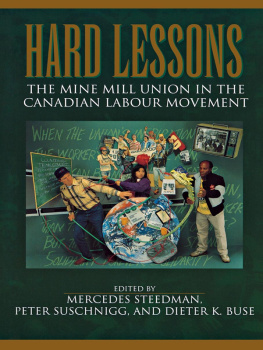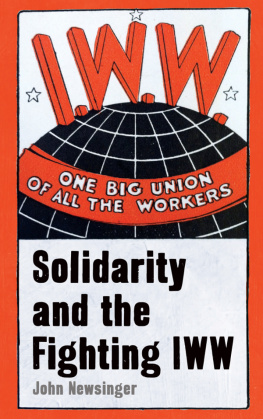Union Renegades
THE WORKING CLASS IN AMERICAN HISTORY
Editorial Advisors
James R. Barrett, Julie Greene, William P. Jones, Alice Kessler-Harris, and Nelson Lichtenstein
A list of books in the series appears at the end of this book.
Union Renegades
Miners, Capitalism, and Organizing
in the Gilded Age
DANA M. CALDEMEYER
2021 by the Board of Trustees
of the University of Illinois
All rights reserved
Library of Congress Cataloging-in-Publication Data
Names: Caldemeyer, Dana M., 1986author.
Title: Union renegades : miners, capitalism, and organizing in the Gilded Age / Dana M. Caldemeyer.
Description: Urbana : University of Illinois Press, [2021] | Series: The working class in American history | Includes bibliographical references and index.
Identifiers: LCCN 2020022805 (print) | LCCN 2020022806 (ebook) | ISBN 9780252043505 (cloth) | ISBN 9780252085406 (paperback) | ISBN 9780252052385 (ebook)
Subjects: LCSH : Coal minersLabor unionsMiddle WestHistory19th century. | Coal minersMiddle WestHistoryI9th century. | Labor movementMiddle WestHistory19th century.
Classification: LCC HD6515.M615 C45 2021 (print) | LCC HD6515.M615 (ebook) | DDC 331.88/122334097709034dc23
LC record available at https://lccn.loc.gov/2020022805
LC ebook record available at https://lccn.loc.gov/2020022806
Contents
Acknowledgments
I hardly know where to begin acknowledging everyone who helped and guided me on this project. Its been a long road, and so many people have aided me as I worked on the various stages of this book. This section doesnt do justice to how much they have helped me, but Ill do my best here.
James Engelhardt and the staff at the University of Illinois Press patiently worked with me through manuscript revisions. Deborah Oliver did a masterful job copyediting this book. The reviewers for this book likewise gave thoughtful and much-needed advice. Their excellent questions caused me to dig even more deeply into the subject, and their insights were crucial in shaping this book.
I am grateful to the organizations and institutions that invested in Union Renegades. University of Kentuckys Bryan Fellowship and the Colonial Dames Fellowship gave me the travel funding for research. The Kentucky Historical Society provided a great environment to learn about publishing while giving me the opportunity to work on this book. As I was finishing the manuscript, South Georgia State College provided additional travel funds for conferences and to nearby archives.
I am indebted to many individuals for giving me their time and feedback at various points of this project. Many years ago, Burton Kirkwood helped me start on this topic and provided the much-needed guidance to begin researching. Ken Fones-Wolf and Ron Formisano helped me develop the themes and ideas that eventually appeared in these pages. Along the way, countless archivists, librarians, and special collections staff across the country went out of their way to locate sources. Andrew Arnold, Edward Blum, Cindy Hahamovitch, Matt Hild, Michael Kazin, Bruce Laurie, Joanne Melish, Keri Leigh Merritt, Chad Montrie, Robert Murray, Scott Nelson, Jarod Roll, Mark Summers, Amy Taylor, and Ashley Sorrell all offered valuable comments on portions of the manuscript or the entire work. Their feedback made this book much stronger than it otherwise would have been.
Anyone who knows me knows that my family has always been more important than anything else. No matter how many miles apart or how long its been since weve seen each other face to face, I can always count on them for a laugh and lots of encouragement. My parents, Chuck and Joan Caldemeyer, likely did not know where this project would lead when it began, but they encouraged me to pursue it anyway. My grandparents, David and Helen Caldemeyer, were always excited to hear of the progress, and I wish my grandfather were here to see it finally in print. Deanne and Scott Jones, Jill and Dustin Hagman, and Beth and Nathan Forshey were always delightful distractions throughout this process. My nieces and nephews, Ethan, Jacob, Hallie, Mason, Landon, and Rosalie, do not care about one word of this book, but spending time with them (or staring at the latest photos) always presented a welcome diversion from working on revisions. Jimmy and Denise King have become my second parents. They welcomed me as one of their own and excitedly cheered me on as I finalized this book.
Finally, Brantley King, my sounding board, cheerleader, proofreader, husband, and best friend, deserves the biggest thanks of all. He patiently waited as I spent weekends and evenings working on this book, sat with me as I researched in the archives, proofread countless pages, and never stopped reminding me that one day this would all be worth it. I love and appreciate him more than I know how to say.
Union RenegadesIntroduction
Jimmy Wilson was nineteen years old when he died. Although he normally worked on his fathers farm, in 1888 both he and his father decided to make extra money working in a local coal mine while their fields sat idle for the Kansas winter. Wilson had only limited mining experience, and while he was hired to drive mules, by November 1888 he was digging coal for the Frontenac No. 2 mine. The pay for miners was higher than for mule drivers and even though Wilsons father wanted him to help with the last harvest of the season and go to school, the young farmer-turned-miner decided to continue earning extra money in the mine.
Rescuers, many of whom were miners or worked in the mines intermittently, rushed from nearby towns and mines to search for survivors. They knew the dangers of the mining industry, and many had firsthand experience with companies who, in their minds, all too casually disregarded miners lives and well-being for the sake of profit. When word spread, then, that the Cherokee and Pittsburg Coal and Mining Company had purposefully misidentified some of the bodies burned in the explosion, the rescuers grew irate. According to the rumor, company officials did not bother to verify anyones identity but instead assigned names to the unidentified bodies and requested that a handful of miners in their employ claim the names were correct.
As the story spread, miners gathered to discuss the situation. The crowds angry murmur swelled into a roar as word circulated that the company refused to let Jean Baptiste Labecqs wife and son view the miners remains. It mounted higher still when several miners claimed that they knew for a fact that the body the company identified as Joe Keller was not actually his. The body should not be interred as Keller, one miner declared. Others heartily agreed, for they could not allow the public and his parents to be deceived by burying a body as Keller when he actually remained among the missing. The crowd fumed at the injustice of a company who looked at the laborers so callously that they were interchangeable in both life and in death.
Such disregard for the Frontenac miners touched a nerve among workers throughout the nation. Frontenac was but the latest result of company disregard for miners lives, Ohio Federation of Miners and Mine Laborers officers declared. Surely such occurrences demonstrate neglect, carelessness or incompetency on part of the mine managers, and if not punished it is because of the laxity of laws passed apparently to protect the health and lives of the miners, they insisted. The mercenary policy, seemed criminal, yet explosions and accidents constantly killed and crippled miners throughout the country. By the turn of the century, coal mine deaths in the United States were nearly triple the mining deaths in Western Europe.


